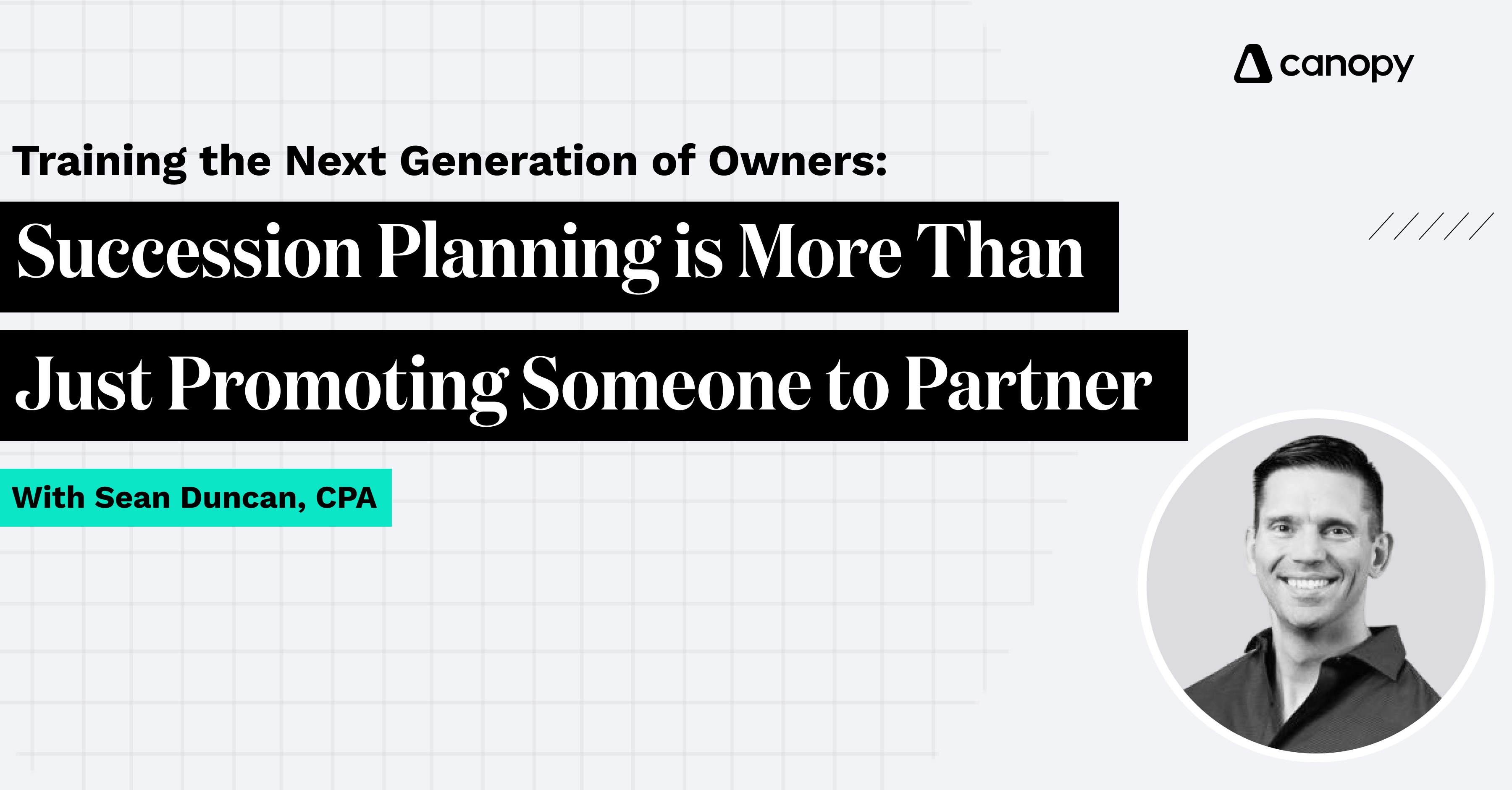You (and your partners, if you have partners) have built an amazing firm with an amazing team, and you are starting to wonder what the next chapter of your life looks like.
Whether or not you retire fully or just step back a little, you will need someone (or multiple someones) to step up and run the firm in your place.
However, most firm owners don’t have a formal process for training new owners. While there are all kinds of systems in place to teach staff how to review the work of junior employees, skilling up their own talents, and a variety of other methods for getting better at DOING the work, most employees lack any formal training on what it means to actually BE an owner. In fact, you may have had to just “figure it out” along the way yourself.
Do you REALLY want your team to “figure it out” along the way with the company you spent all this time building?
Let’s discuss how to set them up for success and what you should consider when training the next generation of owners.
Accountability
Hopefully, you have a great team that is accountable and reliable. They “own” the results of the work they do, and they truly take care of the clients. However, that’s not the same level of accountability we are talking about.
You, as the owner, are not only accountable for making sure the work is done and clients are happy, but you have the added burden of ensuring that bills are paid, your team is fulfilled, that cash flow is adequate, that marketing is on point, that growth is managed, and so on and so on. You see, when you are the owner, the buck stops with you, and that’s a special and unique mindset that employees simply don’t have (yet).
For example, if the firm goes bankrupt, the employee loses their job and goes on to find a new one. If the firm goes bankrupt, the owner will likely have years of debt, damage to their reputation, and a whole slew of other burdens to carry for years to come. Does your employee really understand that?
When preparing an employee to move into ownership, you have to be very candid with them about the responsibilities of being an owner. You will need to make sure they understand that their role not only affects them, but it also affects the livelihood of other people. This is a graduation into the Doctoral Degree of adulting.
I have found that sitting down to talk with key employees about the real expectations and challenges of ownership is of immeasurable value. YES… you may scare off a potential owner, but that person is also the one that might have put the company at risk because they weren’t prepared for the responsibilities of ownership.
I encourage you to take the time to write down all those unique aspects of your firm and the responsibilities of owning it. Be prepared to talk about capital calls, those years when you made less money than your staff, the risk of debt, the pressure to grow, troublesome employee situations, and other realities. These open and honest communications set your team up for success, even though they can be scary conversations to have.
Financial Realities
As I mentioned above, there are different risks and responsibilities of ownership that aren’t experienced by a W2 employee.
Like any investment, there is often a reward commensurate with the risk that is taken. Your business may be the most profitable and lucrative investment you will ever make, but it does not come without a potential downside to consider.
Think of how many business owners were thriving pre-COVID that were put out of business during the pandemic. That doesn’t mean that they necessarily had a bad business (they WERE succeeding before the pandemic), but sometimes life throws curveballs at you, and the risk can be as devastating as the reward is fulfilling.
Your firm is no different.
There will be years (especially early on) when you have too much debt or not enough clients, and you might even have to dip into personal reserves just to keep the business afloat. Your employees need to understand this reality. They may know what the term “capital call” means, but they need to REALLY comprehend what it means for them. Fortunately, joining an existing and successful firm like yours gives them a head start on success different than building it from scratch, but there ARE those curveballs out there that we cannot always predict.
Whether it’s a capital call, assuming the burden of ensuring the staff is paid before the owner gets paid (I’ve read “Profit First”… I’m not talking about that, silly), the realities of leverage and debt (both positive and negative realities), and everything in and around the world of cash flow; your soon-to-be owner has to be ready to accept their assumption of these financial realities.
Leadership
Just because you can do the job does NOT mean that you can lead others to success.
I don’t know about you, but I didn’t receive any formal training early in my career about how to motivate people, lead teams, build an organization, and all that leadership stuff.
Whether you have formal training or not, ownership thrusts us all into a leadership role, whether we like it or not. Unless you want your successor to fire everyone and just turn it into a solo practice, you may want to start taking the steps necessary to get these people the skills they need to lead others.
Fortunately, there are tons of books on leadership, leadership courses, sessions at all the major accounting conferences, and a wide variety of other resources to help build the skills of these future leaders. You can never start this training soon enough. If you wait until they are about to make partner, you will have them doing a lot of on-the-job training and experimentation while in the driver’s seat.
If that doesn’t sound scary to you, it should.
If, for some reason, you discover that an employee will never skill up and become a leader, starting early will give you the choice of either moving on from them as a successor or finding another team member with the leadership strengths to buffer and support that otherwise talented individual.
Sales
How many accounting students graduate with an accounting degree each year so they can do sales?
If you didn’t already know, the answer is close to zero.
Yet, when someone makes partner, they are expected to have already closed a number of deals and will be expected to bring in work for as long as they are an owner. Of course, you have to do that with very little, if any, training or insights on how to go about doing it well. Good luck, kid… sink or swim! How is THAT fair?
If you think there is a lack of formal leadership training in our profession, let’s take a closer look at how much formal sales training we are giving our team. The absence of investment in formal sales training is a bit terrifying, actually. Believe it or not, sales is a profession with skills to be crafted, processes to be established, and technology to be leveraged.
If you are thinking that all they need to do is just hit the local Chamber of Commerce and have a few coffees, are you REALLY putting them in the best position to be successful? There are all kinds of avenues for learning the skills necessary for building healthy pipelines and improving close rates. There are programs, conferences, books, and a variety of resources out there for nurturing the budding sales professional.
Just like with the leadership training, start training your team on sales earlier rather than later. Besides, not only are you setting them up for success as a partner, but they will also be out there helping your firm’s book grow now.
How can THAT be a bad investment?
Time Management & Delegation
Delegation of duties may actually be one of the hardest parts of being a successful owner.
Way too often, I’m working with a firm, and the owners say the dreaded “It’s just easier for me to do it”. This statement kills growth almost as much as bad service. Why? There is only so much of you to go around, and you have limits. When you hit that limit, growth stops. In fact, there are studies that show that pushing to limits might actually cause a recession of growth.
Multiplying yourself by delegating responsibilities (EVEN when that other person doesn’t do it as well as you do) is a necessary solution for hampered growth. And think about this… how will they get good at it if they don’t practice? You, as an owner, must delegate work and responsibility to elevate the use of your time to higher-level functions.
Are you still preparing returns? Knock it off!
Let’s remember, while I’m using the context of growth and success for YOU to delegate now, what we REALLY want to talk about is handing things off to a new owner so you can ride off into the sunset. If you cannot delegate to them, how are they going to learn how to?
Lead by example here. Start by giving them responsibilities to make you a better delegator, then teach them how to do that with their own time. Discuss with them your best practices, teach them how to train, be honest about your struggles, and give them all the tools they need to successfully delegate when they reach ownership status. Here’s another spot where you will be helping your firm today while also planning for succession.
Company Level Projects
As you are training these new owners, you need to give them a taste of what it’s like to make ownership-level decisions. Give them projects and duties that normally would only fall on your plate.
- Need to evaluate and possibly change your project management software? Let a potential owner handle that.
- Need to examine your overall profitability and the impact of making a pricing change? Let a potential owner handle that.
- Want to investigate the impact of new AI tools and stress test them at the firm? Let a potential owner handle that.
Just think of all the management, operational, and executive decisions that only owners make when running the firm. Why not give that to a team member and nurture them through the process of looking at the big picture when making these kinds of decisions? (Note… if this seems like an expansion of the “delegation” topic… it is.)
What’s especially cool about giving these executive tasks to the team is twofold.
One, the best team members appreciate and thrive with these kinds of challenges, and they appreciate the opportunity to grow in new, atypical ways. Can we say: employee loyalty?
Two, I have found time and again that they frequently come up with better ideas and solutions than I would have come up with. Their unique perspective often brings new ideas to make us better in ways I couldn’t imagine.
WORK ON THE BUSINESS DAYS™
This one is near and dear to my heart. While I cannot give you my whole multi-hour training series on this topic in a few short paragraphs, let’s boil the concept down.
The Work On The Business Day™ is time that is blocked on your calendar, on a regular basis, to be the OWNER and not the employee of your own company.
If an owner doesn’t make time to do analysis, to reflect on the performance of the company, build a vision and mission, or any of the other things necessary to successfully run a company, they are really just employees with a boss that’s always watching. Clearing 4-8 hours every quarter, at a minimum, to do all those things you say you will “get around to later” can completely alter the trajectory of a company.
If I, personally, have one secret to my success, it’s this: I MAKE the time to evaluate software, plan for company growth, assess the company’s client mix, build financial projections, re-evaluate our service offerings, create new products and services, and generally plan our future.
If I didn’t, we would just end up at some random destination and wonder how we got there.
If you aren’t doing this for yourself already, start now. Once you have the hang of it, teach the next generation how to make the time for themselves. The power of planning cannot be overstated, and the Work On The Business Day™ is a secret weapon you can all use going forward.
Unique Knowledge
What’s the stuff inside your head that no one else knows? When you are gone from the day-to-day ops and out there fishing, mountain climbing, traveling, playing video games, or doing whatever you want to do with all your newfound time, how is anyone going to know that stuff in your head unless you share it? I bet you have secret tips, tricks, best practices, client knowledge, etc, that would empower the next generation for success.
Start writing it all down and teaching it to them today! Trying to convey a lifetime of experience and expertise won’t happen overnight, and if you ever want to be fully unplugged, you have to share all that wisdom.
In addition to writing it down, I recommend setting up 1-hour trainings on a monthly basis, or even more often if you can swing it, to share all this knowledge. It doesn’t have to be formal technical training all the time. Tell stories, give scenarios of crazy situations and how you handled them, or even just set up a Q&A with the team to ask anything they like.
You know what you know, just share it. Your team will not only appreciate the access to you and your expertise, but they will grow from it professionally as well.
Conclusion
Look… I know that was a lot of stuff, but being a successful firm owner isn’t easy. If you want to give your team a chance to be successful without you, you really need to make the time to set them up for success.
Tradition leads us to believe that we just need to teach them the technical knowledge of accounting, and the rest they’ll figure out on their own. That just leaves too much up to chance.
If you can better situate your team with all those “soft skills” and abilities that you obtained through trial and error with actual training and processes, you will benefit both in the short and the long run. They will too.
Let’s do a better job of setting up future firm owners for success by looking at the whole picture instead of latching onto how to better review a return or reconcile accounts.

Sean M Duncan, CPA, is the President and Founder of SMD Consulting & Accounting, LLC, Chief Proactive Advisors, LLC, and Helping Hand RIA, LLC. SMD Consulting & Accounting, LLC has gained national recognition as an advisory-focused CPA firm specializing in fixed-fee project and subscription services to help business owners and individuals with tax reduction, asset protection, wealth accumulation, and success on their terms. As the "Chief Proactive Advisor," Sean leverages his experiences from creating an advisory firm and helps fellow professionals transition from a reactive to a proactive approach. His methodology accelerates the building of more lucrative and fulfilling advisory practices. His 6-step transformative framework was developed over his 25+ years in the profession.
READ MORE BY Sean






Get Our Latest Updates and News by Subscribing.
Join our email list for offers, and industry leading articles and content.